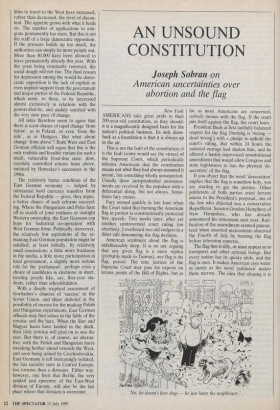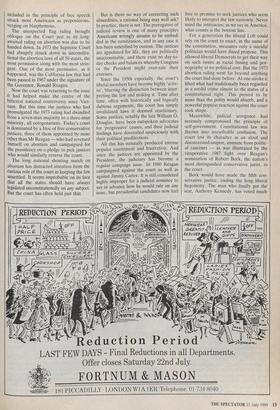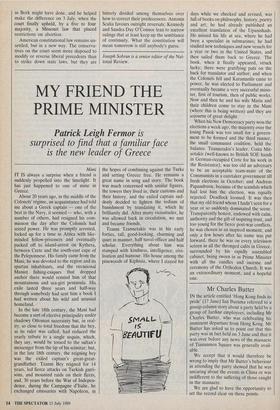AN UNSOUND CONSTITUTION
Joseph Sobran on American uncertainties over abortion and the flag
New York AMERICANS take great pride in their 200-year-old constitution, as they should: it is a magnificently designed basis for the nation's political business. Its only draw- back as a foundation is that it is always up in the air.
This is not the fault of the constitution; it is the fault (some would say the virtue) of the Supreme Court, which periodically informs Americans that the constitution means not what they had always assumed it meant, but something wholly unsuspected. Usually these jurisprudential announce- ments are received by the populace with a deferential shrug, but not always. Some- times fury ensues.
Fury ensued quickly in late June when the Court ruled that burning the American flag in protest is constitutionally protected free speech. Two weeks later, after yet another controversial court ruling (on abortion), I overheard two old codgers in a diner still denouncing the flag decision.
American sentiment about the flag is unfathomably deep. It is no use arguing that any given flag is a mere replica (probably made in Taiwan), any flag is the flag, period. The nine justices of the Supreme Court may pass for experts on arcane points of the Bill of Rights, but as far as most Americans are concerned, nobody messes with the flag. If the court pits itself against the flag, the court loses.
President Bush at first tactfully balanced respect for the flag (burning is 'wrong dead wrong') with a pledge to uphold the court's ruling. But within 24 hours the national outrage had shaken him, and he offered a hastily improvised constitutional amendment that would allow Congress and state legislatures to ban the physical 'de- secration' of the flag.
If you object that the word 'desecration' implies that the flag is somehow holy, you are starting to get the picture. Other politicians of both parties cried fervent amens to the President's proposal; one of the few who objected was a conservative Republican, Senator Gordon Humphrey of New Hampshire, who has already announced his retirement next year. Rati- fication of the amendment seemed guaran- teed when assorted malcontents observed the Fourth of July by burning the flag before television cameras.
The flag fuss is silly, or must appear so to foreigners and other rational beings. But every nation has its quirky idols, and the flag is ours. It makes American eyes water as surely as the word 'politician' makes them narrow. The idea that abusing it is 'No, he doesn't love dogs — he just hates the neighbours.' included in the principle of free speech struck most Americans as preposterous, verging on blasphemous.
The unexpected flag ruling brought obloquy on the Court just as its long- awaited ruling on abortion was due to be handed down. In 1973 the Supreme Court had abruptly struck down as unconstitu- tional the abortion laws of all 50 states, the most permissive along with the most strin- gent One of the most permissive, as it happened, was the California law that had been passed in 1967 under the signature of the Governor, Ronald Reagan.
Now the court was returning to the issue it had helped make the centre of the bitterest national controversy since Viet- nam. But this time the justices who had promulgated the 1973 ruling had dwindled from a seven-man majority to a three-man minority, all octogenarians. Today's court is dominated by a bloc of five conservative justices, three of them appointed by none other than Mr Reagan — who had reversed himself on abortion and campaigned for the presidency on a pledge to pick justices who would similarly reverse the court.
The long national shouting match on abortion has distracted attention from the curious role of the court in keeping the law unsettled. It seems improbable on its face that all the states should have always legislated unconstitutionally on any subject. But the court has often held just that.
But is there no way of correcting such absurdities, a rational being may well ask? In practice, there is not. The prerogative of judicial review is one of many principles Americans wrongly assume to be embed- ded in the constitution, and in any case it has been sanctified by custom. The justices are appointed for life, they are politically unaccountable, and there exist no day-to- day checks and balances whereby Congress or the President might over-rule their excesses.
Since the 1950s especially, the court's liberal members have become highly 'activ- ist', blurring the distinction between inter- preting the law and making it. Time after time, often with historically and logically dubious arguments, the court has simply invalidated laws it deemed reactionary. Some justices, notably the late William 0. Douglas, have been outspoken advocates for 'progressive' causes, and their judicial findings have dovetailed suspiciously with their political predilections.
All this has naturally produced intense popular resentment and frustration. And since the justices are appointed by the President, the judiciary has become a regular campaign issue. In 1980 Reagan campaigned against the court as well as against Jimmy Carter. It is still considered highly improper for a judicial nominee to say in advance how he would rule on any issue, but presidential candidates now feel
free to promise to seek justices who seem likely to interpret the law narrowly. Never mind the intricacies; as we say in America, what counts is the bottom line.
For a generation the liberal Left could rely on the court to enact, in the name of the constitution, measures only a suicidal politician would have dared propose. This allowed liberal Democrats to get their way on such issues as racial busing and por- nography at no political cost. But the 1973 abortion ruling went far beyond anything the court had done before. At one stroke it lifted what had traditionally been regarded as a sordid crime almost to the status of a constitutional right. This proved to be more than the polity would absorb, and a powerful popular reaction against the court took shape.
Meanwhile, judicial arrogance had seriously compromised the principle of self-government. Constitutional law was thrown into irresolvable confusion. The court lost its character as an aloof and disinterested umpire, immune from politic- al rancours — as was illustrated by the vituperative 1987 fight over Reagan's nomination of Robert Bork, the nation'i, most distinguished conservative jurist, to the court.
Bork would have made the fifth con- servative justice, ending the long liberal hegemony. The man who finally got the seat, Anthony Kennedy, has voted much as Bork might have done, and he helped make the difference on 3 July, when the court finally upheld, by a five to four majority, a Missouri law that placed restrictions on abortion.
American constitutional law remains un- settled, but in a new way. The conserva- tives on the court seem more disposed to modify or reverse liberal precedents than to strike down state laws, but they are bitterly divided among themselves over how to correct their predecessors. Antonin Scalia favours outright reversals: Kennedy and Sandra Day O'Connor lean to narrow rulings that at least keep up the semblance of continuity. What the constitution will mean tomorrow is still anybody's guess.
Joseph Sobran is a senior editor of the Nat- ional Review.




















































 Previous page
Previous page